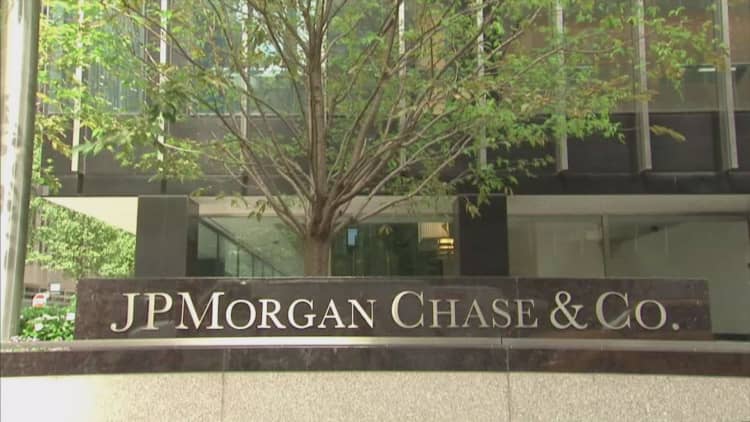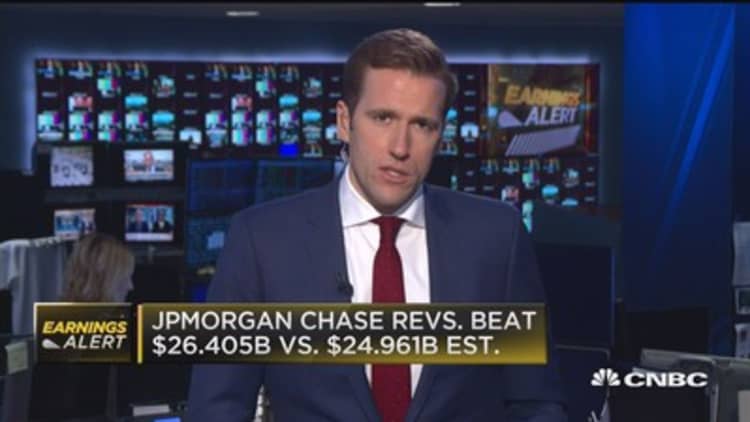
JPMorgan Chase on Friday reported second-quarter earnings that beat on the top and bottom line as strong lending results offset declines in trading.
However, its stock turned down in premarket trading because of its lower expectations for lending income.
Adjusted earnings per share: $1.71 versus $1.58 estimated by Thomson Reuters analysts' consensus.
Revenue: $26.41 billion versus $24.96 billion estimated by Thomson Reuters analysts' consensus.

Shares briefly rose 1 percent in premarket trade before turning to negative 1 percent. In addition to the concerns about lending income, traders believed much of the strong results were already priced into the stock. Shares hit an all-time high on July 6 and are up nearly 8 percent this year.
The bank lowered its net interest income forecast for the year by about half a billion dollars to a $4 billion increase from the prior year. JPMorgan's Chief Financial Officer Marianne Lake said on the firm's conference call that the majority of that reduction came from lower-than-expected net interest income in the second quarter.
Gerard Cassidy, banking analyst at RBC Capital Markets, pointed out on CNBC's "Squawk Box" that the lowered net interest income estimate "certainly is affecting the way the stock is going to be trading today."
"JPMorgan has put up remarkably strong loan growth and it's slowed down a little bit this quarter, but we also saw the net interest margin, which is very critical for all the banks, that came in lower than expected due to higher funding costs," he said. "So I think that's the reason why they're guiding down on the net interest revenue for the year."
JPMorgan two-day performance, extended hours
Source: FactSet
Including a $406 million after-tax benefit from a legal settlement, the bank reported second quarter earnings of $1.82 a share.
In the second quarter of 2016, the bank reported earnings of $1.55 per share on revenue of $25.2 billion.
"We continued to post very solid results against a stable-to improving global economic backdrop," JPMorgan CEO Jamie Dimon said in a release. "The U.S. consumer remains healthy, evidenced in our strong underlying performance in Consumer & Community Banking."
Average loans in consumer and community banking rose 3 percent from last year, while core loans climbed 9 percent. For the rest of the year, JPMorgan said it expects average core loan growth to rise 8 percent.
However, overall market trading revenue declined 14 percent year on year. Fixed income trading fell 19 percent "due to reduced flows driven by sustained low volatility and tighter credit spreads, against a strong prior year," the bank said.
Revenue from stock trading fell 1 percent year on year.
The earnings benefit from legal costs relates to a settlement with federal regulators over the bank's acquisition of Washington Mutual.
The bank also forecast adjusted expenses of about $58 billion for the year, unchanged from prior estimates.
Return on equity rose to 12 percent, up from 11 percent the prior quarter and 10 percent a year ago.
Wall Street was watching whether trading revenues have held up amid low market volatility. In the first quarter, the bank reported a 17 percent year-on-year increase in revenue from fixed income trading.
Loan growth and any comments from Dimon during the earnings conference call later Friday could shed light on the state of economic growth.
JPMorgan said in late June it authorized share buybacks of up to $19.4 billion through June 30, 2018, its largest since the financial crisis.
JPMorgan and 33 other big banks passed the second round of the Federal Reserve's annual stress tests in late June when the central bank did not object to their capital return plans. Only Capital One Financial was given conditional approval of its plan. All 34 banks also passed the Dodd-Frank Act Stress Tests for the third time by topping the Fed's requirements for being able to handle a severe recession.


